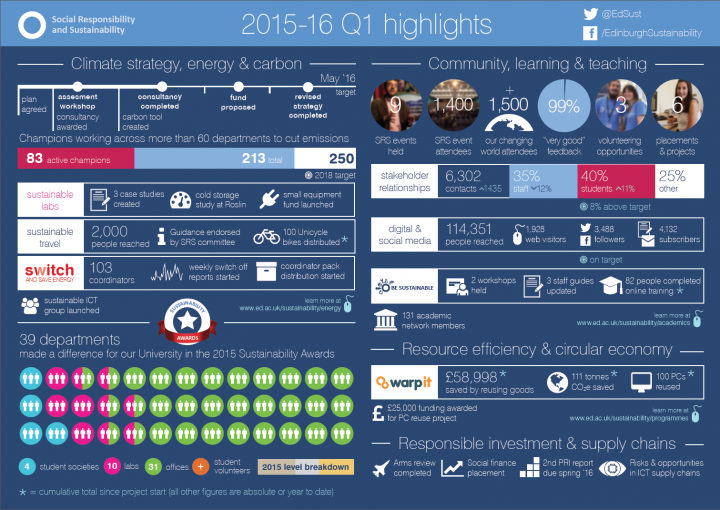Quarterly Highlights - measuring what matters
It has been a busy few months over in the Department for Social Responsibility and Sustainability. Our first quarter highlights are now available and we wanted to share them with our newsletter readers.

We support the University to understand, explain and deliver on its social responsibility and sustainability ambitions. We do this through researching and analysing risks and opportunities and working with others to develop the University’s response to these challenges as well as delivering and facilitating programmes to catalyse action and collaboration across campus. Ultimately we seek to contribute to the University’s mission of benefiting society as a whole.
An aspect of this is reporting on how we’re doing. We are currently in the midst of collecting and collating the annual 2014-15 SRS Report, so please watch this space. You read see previous versions on our website. As a department, our programmes need to connect directly with the achievement of the University’s goals, objectives and targets – but of course this involves many other departments as well.
Proving the link between our work and real change is not always easy. Over the last year we have looked at how we can quantitatively and qualitatively better understand the outcomes from our programmes – through measuring against indicators and through stakeholder stories and perceptions of change. We have some successes and lessons learned.
A key programme area for us is on energy and carbon. Working with others, we want to achieve a 10 percent reduction in energy use from business as usual over 2015-17. In recent months the Switch communication and engagement materials have been revamped and updated and lots of outreach activities are taking place.
But how do we measure success? Of course we ultimately need to contribute to a measurable reduction in energy use, but with a huge campus and hundreds of buildings it’s hard to tell . We would also like to see awareness of the cost (carbon and financial) of energy increase. We want to see more people around the university actively engaged on the topic and we want to effectively support the energy coordinators and others who are key to achieving all this.
We are working with others in the university to understand risks and opportunities in our supply chains. As a founding member of Electronics Watch we want to identify practical solutions, as we recognise that the issues are complex and so cannot be solved by just one organisation in isolation. We have a long standing commitment to Fair Trade.
An area of work we are also developing is also around the circular economy and resource efficiency. We coordinate practical projects such as the Warp-it portal and in the coming months will be doing much more work around computer reuse. We are working to take forward some of our learnings from the project with the Business School, the School of Chemistry, the School of Geosciences, Procurement, Waste & Recycling on Circular Economy Thinking and Action and have been asked to join the Circular Economy network of the Ellen Macarthur Foundation.
A fantastic way to get involved in practical programmes is through the Sustainability Awards. We have had a steady increase across the Colleges and Support Groups in participation and achievement within the Awards, and the team has been working to further develop the scheme so that maximum engagement is achieved across the different areas, ensuring retention of existing Awards participants and engagement of new teams. In collaboration with different academic Schools, we have also launched Dissertation Prizes for 2015/16, to highlight and recognise student research in this area. The Be Sustainable toolkit and training is also a great place to start.
Measuring activities and outputs is fairly straightforward, but it is a challenge to quantify all the positive feedback we have received from staff and students we have worked with over recent months. If you are a student or staff member here at the University and if evaluation and impact assessment is your area of excellence or if you are keen to develop this, we would be interested in hearing from you. Please get in touch.
Michelle Brown
Head of SRS Programmes

Contact details
- Work: 0131 650 4364
- Email: M.H.Brown@ed.ac.uk
Availability
Michelle joined the University of Edinburgh in 2014 bringing nearly 20 years of international experience. Michelle is responsible for the organisation, planning, management and delivery of SRS programmes to deliver our strategies and commitments on climate change, circular economy, supply chains and community engagement. Prior to joining the department, Michelle was a Director in CSR Asia and worked as a consultant for the International Finance Corporation (IFC) and for the International Labour Organisation (ILO) and has consulted for numerous international companies and development organisations in China, Vietnam, India parts of Africa, the UK and Canada. She has served as a Director for VSO in China and previously taught on courses at the University of Hong Kong and at the Asian Institute of Technology (AIT).

